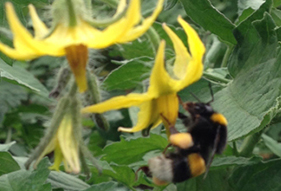Busy bees working for green tourism

Mexican bees make healing honey and money with tour operators funding, but in Turkey the bees prefer cherries!
With support from Thomas Cook and Coop, the Travel Foundation’s Melipona bee project in Mexico started to pay dividends this week, as the Much Kaab female beekeeping cooperative despatched their first order of honey products to a hotel.
The Park Royal Hotel in Cancun received its first delivery of toiletries containing the honey – which is supposed to have special healing powers – on time and on spec. Guests in the VIP section of the hotel will be offered a soap "cheeseboard" on arrival, with a choice of different soaps.

The order for more than 1,000 items – including shampoo, shower gel and soap ¬¬- earned over £2,400 for the beekeepers. Keen to work with local suppliers, the hotel agreed to special terms and conditions of payment that benefit small business such as the Much Kaab cooperative.
Araceli, president of the cooperative, said, "I want to show society that we can reach success, we can reach our goals and rise against all odds. As a group mainly of women we are doing something to banish discrimination against women."
The group’s administration manager, Mirna, who is expecting her fourth child, said, "I’m using this money to buy the first clothes and diapers for my soon-to-be-born baby."
Another member of the group, Erlinda, added, "I’m willing to save money to take my boy to rehab and buy medications, as he is a boy with special needs. I know of other children who have received this care and they have a better quality of life… my kid deserves that as well."
Maya communities in Mexico’s Yucatan Peninsula have been keeping stingless Melipona bees for centuries. Sadly, numbers of these special bees are declining rapidly and the bees are threatened with extinction. It is estimated that there has been a 93% decrease in hives in the last 25 years.
As part of a project set up with funding from Thomas Cook and Co-operative Travel, the Travel Foundation planted 450 fruit trees to boost the bees’ natural habitat, and provided extra bee boxes and training. Now the charity is helping the beekeepers to make a living by selling honey products to hotels. The products are branded "Much Kaab", meaning united or working bees.
The beekeepers are now working to fulfil orders from two other large hotels in the area – keep an eye on the Travel Foundation’s blog (http://travelfoundation.wordpress.com) and Twitter feed (https://twitter.com/travelTF) for updates.
And Semsi Toprak reports from the Taste of Fethiye project in Turkey…
Farmers sometimes use bees for fertilizing the plants in their greenhouses. The bees are introduced artificially from hives that consist of boxes that can be moved from place to place according to where you need them.
Farmers on the Taste of Fethiye project were using imported bees from Holland or Israel to do this job until several years ago when some entrepreneurs established bee breeding facilities in Antalya. These bees are a particular species that are specifically bred to aid tomato production inside greenhouses.
Bees work for about two to three months inside a greenhouse and then the colony has a resting period.
Taste of Fethiye agricultural adviser Himmet Inan usually advises farmers to use at least one hive per greenhouse, but this year two neighbouring greenhouse farmers wanted to see if it would be possible to use the same hive but in different greenhouses to fertilise their tomato plants. We approved the idea to see if it could be a good way to reduce costs by sharing bees.
However, when we were carrying out our routine farm visit in order to provide advice and help to the farmers we found out that the bees were not working as we expected and were not fertilising the tomato plants as they should.
Following some investigations and discussions with the farmers we finally got to the bottom of the problem. It came to light that the farmers were also using the bees to fertilise their cherry trees!
What they hadn’t realised was that if a bee starts to fertilize cherries, they don’t want to work on the tomatoes anymore because they prefer cherries!

Luckily Himmet was on hand to point this out and advise that the bees were not to be let out of the greenhouse to fertilise the cherries. He added that bees in the greenhouse are actually looking for a way to get out and fly around cherries because they taste better than tomatoes. If we had not been there as part of our routine visit the farmer’s crop would have been seriously compromised.
Valere Tjolle
Tourism & Green Growth Agenda – soon to be unveiled – Ministers Briefing on offer, more info HERE FREE Vision special sustainable tourism report offer HERE Sustainable Tourism Masterclass London & Berlin HERE Tell your story to our massive green travel trade audience HERE
 United Kingdom
United Kingdom United States
United States Asia Pacific
Asia Pacific












































Dozens fall ill in P&O Cruises ship outbreak
Turkish Airlines flight in emergency landing after pilot dies
Boy falls to death on cruise ship
Unexpected wave rocks cruise ship
Woman dies after going overboard in English Channel